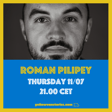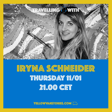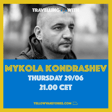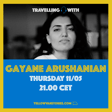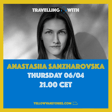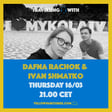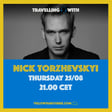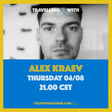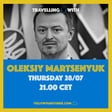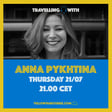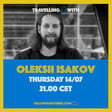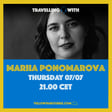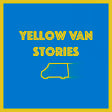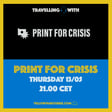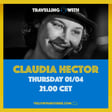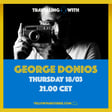Become a Creator today!Start creating today - Share your story with the world!
Start for free
00:00:00
00:00:01

Andriy Dubchak "Dignity"
Today with us in the Yellow Van is Andriy Dubchak, a correspondent and photographer for Radio Free Europe and Radio Liberty as well as the founder of the interactive media platform Donbas Frontliner. He specializes in telling the stories of soldiers and civilians caught up in the conflict in eastern Ukraine. He received a 2022 Free Media Award from the Fritt Ord and ZEIT foundations for his "courageous professional reporting from battle zones." Andriy also received a Lovie award for coverage of the Maidan protests in 2014 and a Gold Medal in the LifePressPhoto competition in 2020, and more. Andriy has captured the main pivot points of the younger Ukrainian history and I am thrilled that he has found the time to join us on the Yellow van today.
I had the chance to speak to him after he had just returned from Bachmut, where heavy fighting is taking place.
FOLLOW DONBAS FRONTLINER
Web
Instagram
Facebook
Twitter
YouTube
Telegram
SUPPORT DONBAS FRONTLINER
Patreon
MUSIC
Love In The Face Of Fear, Jim Kroft
Yellow Van Stories is a Mind the Bump Production.
Transcript
The Struggles of Ukrainian Life
00:00:04
Speaker
One of the small kids said to me, I want to generate, you know, he said it in such a way, it's so open and it's so touching.
Introduction and Purpose of the Podcast
00:00:26
Speaker
Hello and welcome to a new episode of The Yellow Van Stories. I'm your host and driver Bastian. We are so happy and grateful that you have made the time to come on board with us today. We've been waiting just for you and kept your usual seat by the window side.
00:00:42
Speaker
After Russia's invasion of Ukraine, the topic of the second season became very clear to us. We decided to invite Ukrainians into the van to share their stories with us and to learn more about Ukraine's cultural identity. Because too often it has been appropriated by a Russian narrative. The same narrative that now serves as a pretense to the war.
00:01:05
Speaker
Supporting Ukraine therefore in our opinion has a very strong cultural dimension as well.
Meet Andri Dubczyk: War Correspondent
00:01:12
Speaker
So buckle up and sit back because today we're going to meet Andri who has just returned from Bakhmut.
00:01:26
Speaker
Hello and welcome to the Yellow Vents stories. Here with us today is Andri Dubczyk, correspondent and photographer from Kyiv in Ukraine. I'm very happy to have you with us today. Andri, welcome.
00:01:40
Speaker
Thanks for taking the time today because I have been following your work online. We'll get into that. Also your platform, Donbass, a frontliner that does very important work in covering the war, especially in the East, on the Eastern Front, which you have been doing for quite some time. And I can't wait to talk to you about your work and how important it is as well and get a couple of insights from you.
00:02:06
Speaker
Before we do that, I just want to quickly give the listeners a bit of an introduction, what you do, so that they also get an idea and also get already maybe some links that they can follow along. So here it goes.
00:02:21
Speaker
Andrey Dubczyk is a correspondent photographer for Radio Free Europe and Radio Liberty, as well as the founder of the interactive media platform Donbass Frontliner. He specializes in telling the stories of soldiers and civilians caught up in the conflict in Eastern Ukraine. He received the 2022 Free Media Award from the Fritord and Zeit, the German newspaper foundations for his courageous professional reporting from battle zones.
00:02:49
Speaker
Andri also received the Lovey Award for coverage of the Maidan protests in 2014 and a gold medal in the live press photo competition in 2020 and many more. Andri has captured the main pivot points of the younger Ukrainian history and I'm thrilled that he has found the time today to join us on the Yellow Band. So welcome aboard Andri and thanks for being with us.
Ukraine's Fight for Democracy and Freedom
00:03:13
Speaker
Thank you. And thank you for interest for Ukraine and for Russian-Ukrainian war. And thank you for help, Western help to Ukraine, to civilian people, to army and to my country too. Thank you so much. You know, like we said, leading up to this conversation is my conviction that Ukraine is actually fighting a battle that concerns us all, everybody who is
00:03:40
Speaker
subscribing to the idea of democracy and freedom, basically. And I think so. We are actually, according to me, in Ukraine's debt for fighting this war on behalf of all of us. So, you know, no need to thank us, in my opinion, at least. But thank you anyway. So I wanted to just quickly touch base with you a little bit. Where are you right now? I think you're in Kiev right now, correct? Yep. Right now I'm in Kiev. It's like,
00:04:10
Speaker
Not my pressure work, it's like paperwork and like preparation. So I need to repair the car. I need to do paperwork. I need to buy some equipment, repair my photo camera. I need to buy a helmet, new one, and so on, so on, so on. So like preparation and logistic, it's like the same as in the army.
00:04:38
Speaker
one of the main parts of the work here. If you are prepared for the frontline trip, you are more safe.
00:04:49
Speaker
Of course, that makes absolute sense. And I do believe you need a lot of... You constantly have a need of new equipment and stuff because, I mean, you take it through very rough terrain, obviously in a zone of conflict. So I imagine that you are on a rotation, right? From Kiev to the front line and back. Is that how it works? Yes, typically I go to Kiev, spend here some time, make paperwork, make preparation, and after that I go to the front line.
00:05:19
Speaker
But again, like equipment and car, it's like very, very important part of the trip.
The Art and Impact of War Photography
00:05:27
Speaker
And of course, it's like a very important part of the safety, like personal safety. Because for example, I have like a four wheel drive.
00:05:38
Speaker
car and for now, after an accident near Bakhmout, when I was underwater munition shelling, my car lost three wheels and all glasses. After that, I helped all the time with two additional wheels.
00:05:57
Speaker
to be safe, because when you're stuck on the front line, there's no wheels. It's very dangerous, because for now, modern war is like a war of the drones. And if Russia just saw your car on the road, they need just a few minutes to shell it. So car and equipment. Sorry, the only way.
00:06:24
Speaker
Your only way would then be to abandon the car, basically. If you're stuck there for two, three, four minutes, then the best option for you would just be to abandon the car and go without the car, I suppose. Sometimes, yes. Sometimes not. It depends on the situation, of course. But anyway, like car, it's safety. Yeah.
00:06:46
Speaker
No, I heard about the situation when people like a journalist stuck in the mud near the front line and they left the car. But I had the same situation approximately on the new year of 2021-22. It was near Piski. I was in the military and it was deep small. And I had like previous my cars, Kodaktavia. It's not like 4-4. It's like just car for the city.
00:07:16
Speaker
And I snuck in the snow on the potentially dangerous direction. And we go out from the car, I film it. But no, thanks to God, like Russia didn't see it or decided, like, do not shoot and so-so. Then military car arrived and bring out my car from the snow.
00:07:44
Speaker
Okay, wow. You know, for me, this is still, to be honest with you, your photography has brought the war in that sense so much closer to me. Over the last few days, I've been looking at some of your images again, and what really makes them so relatable is you really take pictures, not really of the fighting so
Donbas Frontliner: Highlighting the Forgotten War
00:08:06
Speaker
much, but of the moments in between, like the humanity of it all, in a way, like people, like soldiers in dugouts, like the civilians.
00:08:14
Speaker
and how it affects them. So I think your photography in that sense is very, very powerful because it really shows the human dimension of it all and not just the technological warfare in that sense, which we very often see in media and in the news. So it's very, very valuable for me in that sense.
00:08:33
Speaker
No, my opinion, like every photographer, every reporter, he pass through all like reports, personal relation to the society and to the people. You very easily can see like if photographer, like low people or don't low. So sometimes you can see just like bodies, just scared faces and so on. I love people.
00:09:01
Speaker
And my opinion on the war, it's not bullet, it's not.
00:09:08
Speaker
Artillery is not tanks, the war is fiercely, it's like people who stand with guns from both sides. Of course, I don't have the possibility to go to the Russian part because they will kill me or bring to prison. But anyway, the main part of my report is people and people's soul.
00:09:34
Speaker
No, I tried to show it via photography and via reports, via video. So it's the main part of the war. What is not only about the death, war is also about
00:09:52
Speaker
life, live, watch people alive. The main part of the report is about people who are alive, who survive, and who protect their own freedom and country.
00:10:08
Speaker
Yes. So also at this point, I will really point out and really emphasize to go and watch Donbass Frontliner, your website. And I will obviously link to it in the show notes to really take a look at the images and if you're interested and take a look because it paints a very, very good picture. And I'm very grateful that you're doing what you are doing, Andre.
00:10:31
Speaker
You've just come back, yes? The website, like for now, we just start to rebuild again, yeah, but main part of the photo and main part of the story, as you can see on our Instagram, Donbass Frontline, it's English language, so it will be easy for audience from abroad.
On the Frontline in Bakhmut
00:10:52
Speaker
I'll link to all of that, obviously, so that people will have it very easy to find you. So you also just said you've just come back from Bakhmout, right? We are hearing about Bakhmout like every single day and that Russian troops are advancing, apparently. How is the situation? How was your work there over the last few weeks, months? How long were you there, actually, to start?
00:11:25
Speaker
I was directly in Bahmut in the summer. So I was for three days. And before the Bahmut, honestly, I felt like I saw the war, because I covered the
00:11:38
Speaker
Russian-Ukraine war seems like 2014.
00:11:55
Speaker
Still very often the idea is that the war started now in 2022, but the actual effect is the war started in 2014 with kind of like an ongoing conflict that was never resolved and then just taken to another level in 2022. Would you agree with that assessment? Absolutely. Absolutely. And the idea of the Don Bosco Fly in the Project in 2020, it was
00:12:22
Speaker
pay attention to the forgotten war. Because in 2020, we had like 450 kilometers of the frontline trenches, like dozens and thousands of soldiers in trenches. Every night fight with small arms, sometimes artillery, sometimes tanks, like, and so on, so on, so on. So it was like, my opinion, it was big training center for Russian troops, which like,
00:12:51
Speaker
regularly came to this like frontline and test on soldier on commanders have new kind of weapons and yeah
00:13:04
Speaker
in 2021, it was really forgotten war because my team was probably just one team who worked directly for social networks from the frontline. And then like more
The Power of Storytelling in War
00:13:18
Speaker
close to invasion date, of course, like international media start to arrive to Ukraine and to show situation and possible escalation like at that time. But unfortunately, 24 of February,
00:13:33
Speaker
it's like start of mass Russian invasion to Ukraine, but even like before this date like There was an ongoing war on Ukraine. Thousands and thousands people died and dozens of thousands was wounded and lost legs Arms, eyes and so on so on so it just new level of the conflict the invasion and
00:13:59
Speaker
Yes. The reason why I want to point this out also is because there seems to be this conviction in a way that we can just sit down. I mean, we, you know, like all democratic countries basically, and have negotiations in a way, and then come to some sort of a conclusion. But I think if you take into consideration that this war is an ongoing one since 2014, with now just another push, it puts that also in a different perspective in a way.
00:14:24
Speaker
I can add. Yeah, please add. Please, by all means. It's not only like, well, we talked about the Russian-Ukrainian war just now. But honestly, it was the first century. Russia stole the history of Ukraine because all Ukrainian kings sit here and care. And all of them speak Ukrainian. Russia, like,
00:14:50
Speaker
say for all time Ukrainian language don't exist. But people who know Russian don't understand Ukrainian and vice versa. People who know Ukrainian, just Ukrainian, they don't understand Russian language. They have different culture, different history. And Russia for a century killed Ukrainian. And just in the last century, they killed like dozens of millions of Ukrainians.
00:15:18
Speaker
especially it was like framing a lot more when Russia killed, most Soviet Union killed.
00:15:26
Speaker
approximately 4 million of the Ukrainian was 100. And after that was 1937, 1939, when Russian and Soviet Union, like, yeah, yeah, yeah, they killed a lot of, shoot a lot of Ukrainian who was smart, the most, like, best people in the country and send millions to the Gulag, to the prison on the Siberia. And World War II, yeah.
00:15:52
Speaker
during the World War II Ukraine lose the most amount of the population in percentage so yes it's like very old like war and very old to each other yeah
00:16:08
Speaker
Yeah, a very old conflict and mainly always at the expense of Ukraine. And therefore, you know, one of the reasons for this podcast as well, we have forgotten because of that, because Russian narrative has dominated Ukrainian culture, that Ukrainian culture is very old, indeed older than Muscovy, if you will, for that reason, and has had a lot of cultural, you know,
00:16:33
Speaker
marvels that a lot of the times are just now under the heading of Russian culture and Russian history. So this is one part of one attempt to free Ukrainian culture from that little bit with your help and all the other Ukrainians who are taking part in this podcast, which I'm extremely grateful for.
00:16:52
Speaker
Of course, so this is another piece in that in that puzzle today. And now speaking of culture, can I just quickly go with you a little bit into before we open up again a little more into the into the photography and what you do? I would like to know from you how you actually got into photography. What what made photography for you for you such a medium of such interest that you said I want to I want to follow through with this.
00:17:18
Speaker
It's a long story, but I try to tell it short. I have a lot of time, Andrei. Don't worry about me. Yeah. My field of education is like mechanic engineering, car and tractors.
00:17:37
Speaker
After that, I had a degree in network engineering, so IT, so on, so on, so on. And since 2003, I joined the Radio Free of Radio Liberty as an IT expert. Social networks, security, website, programming, databases, and so on, so on, so on.
00:17:59
Speaker
And in 2013, yeah, I was probably just one person who knows how to use live stream and device live view. So it was new technology in 2013. It's for now like you can make stream like from your mobile and so on. But at that time, it was like super new cool technology from
00:18:22
Speaker
some Israeli company, and we had this device. And at the day of the beginning of the Revolution of Dignity, I was just one person who knew how to use this device. So I decided to go to Maidan, to the Independence Square. I started to film, so I became occasionally the first female of the Revolution of Dignity.
00:18:48
Speaker
This was 2014, right? 2013, yeah. Yeah. And after that, I stream probably all the most important part of the revolution of dignity, clashes, fights, and the most bloody day, 18, 19, and 20 of February 2014 when, like,
00:19:12
Speaker
police and special forces killed a lot of people. A lot of people fled to the convents there, around there. It was a terrible, terrible day.
Andri's Journey from IT to Journalism
00:19:24
Speaker
Yeah, it was terrible day. It was terrible video. And I probably even had small PTSD from all of it because it was my first experience when you're in real life how dazzled the people and died people. Yeah.
00:19:39
Speaker
And after this story, occasionally I take in my hand like half professional photo camera, go to the streets and make few photos. And I made photo of the Anastasia.
00:19:58
Speaker
After that, she joined the armed forces in fight on the east of Ukraine, in the first year of the war. But I was impressed with this portrait, and I realized that
00:20:15
Speaker
photography is like and photo is universal language so if even people don't know language, don't know the traditional how like different skin color anyway the photo is the most like universal language and one of the most powerful language to show the situation yes and in 2014 I
00:20:41
Speaker
decides to be photographer and start to learn photography.
00:20:45
Speaker
Can I just quickly add here the revolution of dignity 2014 for everybody who doesn't know was because Viktor Yanukovych basically sacked decisions to open up towards Europe and turn towards Russia again, right? And this caused a big outcry, public outcry in these demonstrations. So there was already a conflict with Russia there as well that caused this. I just wanted to point that out, yes, for the listeners. Yes. So please carry on, Andrei. Sorry.
00:21:15
Speaker
So I decided to learn photography and
00:21:20
Speaker
When I was small in school, I wrote a lot of cartoons. It was very funny. I paint a lot in childhood. And when I work on the website of Radio Free or Radio Liberty, I perform a function of build editors. So I select photo from photo agency, from Reuters, from Associated Press,
00:21:51
Speaker
and many, many others. And so for years, I look at the photo of the best photographers in the world. And of course, it's also helped me with this profession, is my choice. So composition, like what is cool, what is not cool, which photo is good, which photo is bad. For me, it was very easy when I start to make own photos.
00:22:20
Speaker
And then in 24 I got the Crimea and made reports from Crimea about Russian annexation of Crimea.
00:22:31
Speaker
Yes. Were you on Crimea actually? Were you on Crimea? Because I imagine Crimea was, you were, so it was still accessible in a way because now I realize or I imagine it's not so easy to get there as a Ukrainian, right?
The Importance of Local Journalism
00:22:43
Speaker
On Crimea. In 2014, it was like officially Ukrainian. So there was a lot of Ukrainian troops and army and some green like
00:22:53
Speaker
people, it was Russian like Special Forces and Pia and so I arrived to Crimea and I was there for one and a half week and after that I escaped the peninsula because I was scared and all my team was scared.
00:23:12
Speaker
special intelligence service of Russia which followed us from time to time and a few times per day someone called me and it was silence in the mobile so it scared me much more than like
00:23:30
Speaker
even people who follow us and few times per day I got notification from Facebook and from Gmail like someone tried to attack your account and sorry it was like very scary time for me and after that started Russian like secret special operation for liberation was Donbass
00:24:00
Speaker
Yes. They create like... The big propaganda, basically. Yeah, fiction-wise. That is, yes. Al-Anar and DNR, like Donetsk People's Republic and Lugansk People's Republic. And yeah, I decided to go to the front line and show the work. And from that time, I probably spent at the front line more than one and a half year in top of...
00:24:30
Speaker
Do you remember the moment when you decided that you're going to do this full time now? Was there anything that you remember? Was there any special trigger or like the day you set out to do this and you decided I will do this full time now? It was like a long story. I remember this day. It was like in 2019.
00:24:55
Speaker
During one of our trip to the bombast, to the east of Ukraine, it was in Mariupol. And the very big fight happens between Ukrainian and Russian in the middle of the front line, like more than 200 kilometers from us, from our position. It was approximately 1,500 shells in both sides. At that time, it was a huge escalation.
00:25:22
Speaker
So we decided to go and to cover it and when we arrived, because the road was bad, the road was not straight, so we arrived just maybe like one and a half days after. And we were the first reporters who arrived at the place. So I realized that this conflict
00:25:48
Speaker
really forgotten and I need to spend my effort to show it to Ukraine and to the world because even in Ukraine like main part of the society
00:26:00
Speaker
didn't pay attention to this conflict and forgot about him because it was like, no, you can imagine like eight years of the frontline. So, people was not interested in this subject and to cover the conflict, to cover, to show to Ukraine and more, I decided to create the Don't Boss Frontliner project. It was like 2019.
Photography and Ukrainian Resilience
00:26:25
Speaker
I started to collect money in 2020 and like,
00:26:30
Speaker
trip to the front line with this project was in 2021. Wow. And now if you, if you talk to me, I mean, the thing is, you know, this is something that I think not everybody can necessarily relate to. Like you put yourself in harm's way, right? Voluntarily you go to places where people usually run away from. What do you hope to achieve with your photography? What, what gives you the motivation to do this?
00:27:04
Speaker
It's not easy question because you know like all time people have combination of the motivation. So I can't say like I'm like Ukrainian and must do it. Maybe the most like
00:27:20
Speaker
main answer, because I'm interested in this, because the front line all the time attracts my attention, because people at the front line, I like low people, so for me it's interesting that we have early people.
00:27:36
Speaker
And at the front line, they don't have time to wear the mask, because in everyday life, you know, you need to wear a mask, be polite, like smile, so on, so on, so on. At the front line, in dangerous situation, people don't have time for it, and it's very interesting for me, also for human beings, and also for photographers.
00:28:02
Speaker
No, of course I'm Ukrainian and I realize at that moment Russia will go ahead sometime.
00:28:16
Speaker
Well, it's like a lot of combination of the motivations. So interesting for me, I can make it like really good and high quality. I am Ukrainian and it's probably one of the way to protect Ukraine from Russia and from future invasion at the time. I thought about
Ukraine's Civil Society as a Stronghold
00:28:40
Speaker
it like, that's about protection from invasion in the future.
00:28:45
Speaker
So it is about creating awareness, of course. I think that's also quite obvious that this is what information does. But this other part of your answer is something that I find very interesting because the way that I understand, and correct me if I'm wrong, for you there is a human layer during war or at war times that is otherwise very often I'm overlaid by the other layers of our civilized life, right?
00:29:13
Speaker
right to the core of human existence in a way. Am I understanding that right? And this is fascinating, obviously, for you. Yes. Yes. And this probably is the most important part of the world because, as I said, the gun, the cells, again, bullets, just like
00:29:35
Speaker
something yeah just like things but core of this war yeah core of this like fights it's like people is a gun they solve brain and motivation so we need to show it to audience in Ukraine and abroad yeah Ukrainian like for now most strong Russian it's not because we have like
00:29:58
Speaker
It's a better gun. We don't have guns enough now. And Russia has much more guns. But at the same time, people's soul is strong and we want to fight because it's our home, our freedom, it's our country. So yes, the most interesting part in all conflict, in my opinion, is people.
00:30:22
Speaker
Could you then also say that you want to, and I'm not trying to put words in your mouth, right? So correct me if I'm wrong, but because you're talking about Ukrainians and I feel there is a strength and you want to show that strength also of the Ukrainian spirit to motivate the rest of Ukraine, the rest of the world to fall behind that spirit, to show that in order to support your cause as well? Could I say that?
00:30:50
Speaker
Yes, of course. Is that what you're looking for also in these images, the strength of people? Strength of the people, because really when you arrive to some places, sometimes you really scare it. Sometimes you try to escape these locations, these trenches, these positions, but at the same time,
00:31:18
Speaker
just Ukrainian men's like women's it's not like professional fighters it's people who took like a gun in hand just maybe a few months ago and I'm like scared at the same time they are so scared but they're brave because they stand and they fight and they realize like they protect like Ukraine from the Russian
00:31:44
Speaker
Yes. I see that also in your images. It's very evident that you see there are a lot of young people also, women, men, like you just said, that just have quit their usual jobs and are now, you know, fighting on the front line to protect Ukraine from this war of aggression and invasion from Russia. Yeah. No, before the invasion, we can
00:32:11
Speaker
We can talk like we have like military and we have civilian part in Ukraine. But now I think it's like very hard to divide civilian and military because like yesterday ice cream like sailor or like I don't know like
00:32:32
Speaker
taxi driver, now they are part of the Ukrainian army. Someone of them like decide to be volunteer. Someone of them like just get like conscription call from government and go to the army. No, but anyway, the army and society now it's like one big organism, one big like
00:32:57
Speaker
It has been molded together by the Shia outside force, I believe, also of the Russian invasion, of course, right? Yes, yes, right. Now, I would like to go back to Tupar Mut a little bit with you, because you said you've just been there and we have it all over the news at the moment. What is your assessment there at the moment? What is going on?
00:33:25
Speaker
For now, Bakhmout is half encircled, and my personal opinion Ukrainian army needs to go out.
00:33:36
Speaker
Because typically it's a defense line. To go out? You mean retreat? Like go back or go out? Yes. Yes. Retreat. Yes. Yeah. Retreat. Because for now, a lot of losers and Russia have domination with artillery and with all type of weapons in Bakhmut. So to save people's lives, to
00:34:02
Speaker
protect from unnecessary losses, the Ukrainian army, in my opinion, must step back in this fight. Because for Russia it's just like an information adventure, it will be an information victory, but at the same time Ukraine can save hundreds and thousands of people if we step back in this battle.
00:34:27
Speaker
No, it's my personal opinion. Because I spent the last three days, and you know, like before the Bakhmut, as I said, I saw the war. No, like Bakhmut is like really World War II in like most war scenarios. Because first day it was fog, it was rain, and
00:34:49
Speaker
I can hear the explosion in the city like every like five seconds approximately. But next two days it was like sunny and Russian drones probably fly in the sky and every second you hear explosion, every second. Different distances like
00:35:10
Speaker
far from you, more close, the building next to you, the building behind you. So it's like one second, one explosion. One second, one explosion. One second, one explosion. Cluster munitions, shells, mortar, sometimes missiles, sometimes airstrikes. So it's really horrible. And it's really scary.
00:35:39
Speaker
How does it affect you? I mean, if you say that you haven't seen anything like this now, I mean, because, you know, I've been, I've been in some situations, nothing like this, by all means, this is not a comparison, nothing like this. But I know when I've been in situations of such duress and, and, and terror, like you just said,
00:35:56
Speaker
Um, even though I'm not even really sure what that means after you've just explained this, um, you have, uh, you take something away from it. You, you, it's like you leave a part of yourself there in a way. Right. And there is some sort of, uh, um, you know, it takes a psychological toll. How, how do you cope with that? Uh, no, I realize I need to do report. Yeah.
00:36:22
Speaker
But anyway, I was very careful. And one time I reject one of the trip to the very dangerous part of the city. But at the same time, I was in another very dangerous part of the city. And the sun I saw, the picture I saw, it was one of the most horror and incredible in my life.
00:36:48
Speaker
We go with funeral team to take out the body of the civilian who was killed by a Russian airstrike. We arrived at the place and I realized that I saw the Russian position like maybe in one kilometer from me from this street. Street was completely destroyed by airstrike. It was just like
00:37:12
Speaker
bricks and woods and the locals who escaped underground start to scream like go out from here. I know I realized they were in shock here but at the same time I realized it's like a very dangerous place and if I will start here I will die. I may just
00:37:36
Speaker
maybe two pictures, there was a windshield glass turn back my car and escape this location because it was really dangerous. And no, I was under many type of weapon like fire. I was under heavy machine gun fire, under sniper fire, thanks to what not very many professional fighter. I was under direct mortar attack, direct post-remonition attack,
00:38:03
Speaker
And after all these cases, you need to be very careful with your reports. And I realize sometimes you need to stop yourself and do not go ahead because you have one life.
00:38:20
Speaker
no one picture in the world will not cost your life. So in Bahmut I was very careful, I made the plot and I escaped it. And it was in December, end of December, yeah. But last time when I was in that part of the country, we decided
00:38:41
Speaker
do not go to the Bakhmud because it was very dangerous first. And second, what you can film there. So you'll be just driving through the city with no mobile network, with no information and with unpredictable result of the photography and videography. Because people typically hide in underground and you need to find this underground and like, no, it was like,
00:39:04
Speaker
it wasn't necessary at least to do reports from the Bakhmout in such conditions like not one week ago.
00:39:13
Speaker
And then, but you must also carry that shock. I mean, like everybody gets shocked, right? I mean, if you find yourself in that, like... Yes, I was shocked here, but again, like it's not my first experience with artillery and fights, but I can say like day number three, I was so scary, so I can't make photo and video, I just like smoke.
00:39:41
Speaker
Smoke inside the buildings and Russia shell all around us. And the guy who stabbed me in one of the buildings said, it's like a good building, but we have just wooden floor, like old school. So it was not concrete, just wood. I realized if mortar or shell,
00:40:06
Speaker
You'll hit this building, all of you. All of us will do that like for a long time.
00:40:12
Speaker
Uh, so, but then if you, if you're in this situation or this is something and that's why I still like follow through with this a little bit. Like if you go through this, like the first instinct is to get away from there, but you stay and you keep reporting. Um, maybe not this time, but you will go back. This is what you do. Like how, where do you find that strength? Where do you find that conviction?
00:40:38
Speaker
Is it in your private life? Or is it just because the cause for you is so strong and so valuable that you don't even question it anymore? It's a really hard question. Sometimes I ask my own the same question.
00:40:59
Speaker
I don't have a clear answer. It's again a lot of answers. I'm professional indeed. I had an experience. Probably I know the situation, probably not.
00:41:14
Speaker
It's my country. I need to show it. A lot of people like brought me very good words about my work. So I realize it's important and it helped to Ukrainian. Sometimes it helped to real people, to civilian, to children. It's bring help and donation for them. So how can I stand away from so big fights of my country?
00:41:45
Speaker
for freedom, for no, one gear like.
00:41:51
Speaker
When the invasion started, it was Ukrainian language teacher, young woman like 30 years who took AK just Thursday in her hand. She said like a very interesting phrase for me. We just want to live in our country. When I ask her, why do you decide to take the gun in hand? We just want to live in our country.
00:42:17
Speaker
big answer to very many questions. Yes. I think the emphasis lies on your country, right? Nobody else's country, but your self-determined, independent country that is free to choose as your wish.
00:42:33
Speaker
When I was in Crimea during the annexation in 2014, I felt real pain from freedom of speech. For many of us, it's just words. Before Crimea, for me, it also was just some words, freedom of speech. But when I saw all this behavior of the Russian
00:43:01
Speaker
this like crime and this like an honest situation and I realized in the same moment if I told someone something wrong at least they will beat me and they can can kill me just because I say the truth I said the truth yeah so it was like real life
00:43:30
Speaker
physical pain for me when I can't say what I want. Yeah. So freedom of speech for me, it's like very important. And I realized if Russia gets Ukraine, me and people around me will be just slaves. There's no rights. There's no freedom of speech. There's no freedom of movement.
00:43:57
Speaker
Potentially, a lot of people will die just because they do not fight now. In history, we have a lot of cases. The same like famine, 32-33, the same like Gulag prison, the same 1937 shooting of the people, mass killing, and so on, so on, so on. So sometimes to protect your life,
00:44:27
Speaker
maybe you need to fight really, because just one way. You can give up because you realize after that you will believe first one in the horror, in the fake country with fake peoples, and at the same time you will lose your dignity. And that's all. The dignity is very important part of the
00:44:57
Speaker
this fight for Ukrainian? I think that is a very strong point to make. Yes, it is. And Ukraine has shown for a lot of time now, for a long time, if you look at the young history of Ukraine, there have been three Maidans and it also shows how much power there is in Ukrainian democratic movements. So this is absolutely a continuation of what has already been happening.
00:45:26
Speaker
for now almost 30 years, 35 years almost. I would like to ask you because, yes, yes, sorry, Andre. It was not like very fast, like,
00:45:38
Speaker
process here when this like civil society... Is it ever? No, of course not. Yeah. But again, we had a few revolutions and for now we have really amazing civil society. People who took part in all this revolution in the first years of the war and now joins the armed forces or help to army in all possible way. It's like amazing.
00:46:06
Speaker
huge body of the people connected to each other and who really know and trust each other. So it's like a huge network inside country which helped Ukraine to survive.
00:46:18
Speaker
There is a common cause. And I think this common cause is also making the difference while you are fighting a war against an enemy that actually has a lot more manpower, has a lot more equipment, has a lot more money, has a lot more of everything, but Ukraine is putting up a fight because the cause is, in my opinion, of course, but I think for a lot of people, the better one. And I hope for all people, the better cause.
00:46:48
Speaker
You are also, as a photographer, you are a keeper of stories, right? This is what we do. I like to name myself as well because I also do photography. And so, you know, photographers are the keepers of stories. Is there any particular story that you think back off now over the last couple of months that really touched you, that stayed with you, that's very difficult to shake off? Yes, I have a few such stories.
00:47:17
Speaker
Some of them was published, some of them not yet, but will be. One of the stories is like children from Bakhmut. I go to some like food point and hitting point, and saw the family, husband, wife, and three small children, like eight, 12, and 14 years.
00:47:46
Speaker
And I decided to follow them to his house. It was like underground. They live in such conditions for a few months. Under shelling, without water, without proper food, without proper heating. And it really impressed me. Because when I start to talk with them about the situation and what children want to Christmas,
00:48:14
Speaker
One of the small kids said to me, I want to have a generator. He said it in such a way, it's so open and it's so touching because in this century, in the modern world, kids don't want Barbie, don't want ice cream.
00:48:44
Speaker
At that moment, they really want to have generators, just to play maybe PC, notebooks, some games. But it's really, really touching at that moment. And thanks to God, these kids escaped the city and now they live near Kiev. And I try to collect some money for them to help the family. And this story has
00:49:14
Speaker
Happy end, yeah. The other interesting story, also the same Bahmut, we follow the funeral team, and at some moment I realize these guys, who was performed before it, the communal CP cleaning service, and they just joined this funeral,
00:49:41
Speaker
team because someone needs to do it. Someone needs to take our body and put it to the cemetery, to the graves. These guys don't have bulletproof vest. They go through all this sitting, under shelling, in a very old car without bulletproof, without helmets.
00:50:05
Speaker
I also was impressed with it and I started to collect money from them. We bought bulletproofs, we bought helmets and a few days after one of these guys brought to me and said, thank you man, you saved my life today with your bulletproof.
00:50:28
Speaker
involved in my hand. Your helmet saved the life of my friend. Unfortunately, the man number three got wounded in stomach and now he's in the hospital. But anyway, it's
00:50:45
Speaker
sometimes you can help not even to show the situation, sometimes you can help to the people with something real, with bulletproofs, like with money, with toys for children, and so on, so on. Every trip have own story, have own pain, have own impression, but I really like travel a lot, so all my impression like
00:51:13
Speaker
the old time arrived new and impressive and you don't remember the impression of previous because it's like all time Russian you have very many like around you so few stories from last week
00:51:31
Speaker
You know, we are all, I think, a collection of all the stories we hear, including ourselves in a way. I think that's what human beings really are in a way. So you obviously are a large collection of those. And that's a very touching story also that, you know, that it can make such a difference. One bulletproof vest can make such a difference. One helmet.
00:51:53
Speaker
can make such a difference. I think sometimes we don't stop and realize that really this one piece of gear equipment can save someone's life, a real person's life, right? And I think the stories that brings that home very, very clearly and touches me also. And I'm sure for you, that must be an amazing memory to have achieved that with just collecting vests and helmets.
00:52:24
Speaker
Thank you for sharing those stories, Andri. I think you would have so many more of those and maybe we will actually come back at some point. But actually having said that, this is a good moment also to maybe make the move over to Donma's Frontliner where you connect all these stories, where people can go and read them. So would you care to just give us a bit of an overview what the idea of Donma's Frontliner is and what it set out to do?
00:52:48
Speaker
The idea of the bus airliner is like reporters' media, it's like not analytics, it's not like news, it's like true reporting from the place.
00:53:02
Speaker
where our reporters is present at this moment. True reporting and of course like this information about war for Ukrainian audience and for international audience and big part of the project it was like help to Ukrainian media and to international media to show the conflict.
00:53:28
Speaker
I have a time a lot of call, a lot of messages from big international media from freelance and so on, so on, so on.
00:53:41
Speaker
I try to help them all with information, with access, with stories, and so on, so on, so on. And also one of the parts, I realized we're not big media yet. For now, we have just two teams who can go somewhere. If we can cover the subject, we need just to highlight it and show to other big media, which
00:54:09
Speaker
After that, we'll do a big report about you.
00:54:17
Speaker
I can only recommend going there because I've gotten a lot of information from there lately. I have looked it up and as I said, the stories are very important because I do believe, especially the stories that are kind of aside from the mainstream of media coverage, I think they are very, very important to hear because they give war a human
00:54:43
Speaker
face and I think we should never forget that it's not numbers, it's not that we hear that there's 100 people dead in a day or 200 people dead in a day. It becomes numbers at some point and we have to realize and remember every single number is one life that is lost, a life that has a family
00:55:04
Speaker
children, lovers, parents that mourn for the loss of this one person. And I think in what you are doing, this is something that makes sure that people do also see that side and understand that this is a side of the war that may never be forgotten. Yeah, the best way to show situation and it's like to show someone personal like life at the front line. So it's important.
00:55:34
Speaker
Yes, absolutely. Um, I would like to ask you, um, if I may, and tell me if I'm, if I'm overstepping a line and you, you know, absolutely no problem, but I would also like to, um, just ask you because doing what you do, it also must affect your private life. Obviously I had the, I had the, the, the, the luck of having been in communication with your wife, who is fantastic. Amazing woman. Um, greetings on this end here as well. Again.
00:56:02
Speaker
Thank you for taking care of the back end of things a little bit. How is it for your wife to see you go and put yourself in harm's way in return? I'm sure that must be very difficult. Is it something you get used to or is it something that's also just very difficult for you guys? It's more about private life.
00:56:28
Speaker
You don't have time for it like often, really. I haven't seen my parents maybe for...
00:56:39
Speaker
five months, something like this. And with my wife, we meet also not very often, for example, we haven't seen each other for one month here. But at the same time, Lisa, like Mary's part of the project, she became a manager, and she also worked for other big media, like NBC News,
00:57:07
Speaker
when the war started, her heels, New York Times, how she was on a map, and she had now really huge experience, and she now very, very helpful for the project, without those hurt, like a lot of things, not possible now. So a lot of compliments to my wife.
00:57:35
Speaker
Deservedly so. But unfortunately, of course, all these reports, all these trips take away me for long period of time. Yes. From family, from my three cats and from here. So it's like some story, but at the same time I realized I need to do it. Yeah.
00:58:02
Speaker
Okay, well, again, from my side here, just to point it out again, thank you to Lisa again for for making, you know, preparing this today. She did she did a great job with that always very much available. So thank you again. Yeah, I see that you guys, though, with all this difficulty, I found a way of of turning it into a collaboration into something that you both share. And most probably, this is also something that that helps, I suppose, that you both feel the need
00:58:31
Speaker
to do it yes but no at the same time i realized we all of the Ukrainian journalists and especially me we have like very big professional deformation
00:58:45
Speaker
For example, not so many times ago, I was in the funeral. It was like you are the pregnant soldier. All people cry around me and I just don't know. I didn't feel like nothing. It was just body. So I don't know why, but sometimes I cry, sometimes I do not feel nothing because maybe the brain
00:59:16
Speaker
wants to defend yourself from all this scary story, from PTSD, from stress and
00:59:26
Speaker
You just do not feel nothing sometimes. So professional information is very big. And at the same time, I have no story. The reporter from the United States, Stephanie, came to Kiev to film other work, to film the situation in Ukraine. And she was here just for two days.
00:59:50
Speaker
and in the morning she called to Lisa and said like I decide to escape the country because I'm too scared about the situation about this air strike alarm and about the horror of the war even in Kiyo like for last year it's like completely safe yes you know like yeah so just
01:00:14
Speaker
For me, it's like deep, deep, and far from the front line. For me, I feel completely safe here. But people who arrive from the United States, from European Union, sometimes they are really scary.
01:00:33
Speaker
They see horror around. So professional information, I can say it's very big and we stuck in this period of the war. So it's just fact. Yes.
01:00:53
Speaker
I would like to ask you something because knowing the frontline, like this is, you know, I think it's important because I do hear, look, I'm German, right? So for me,
01:01:08
Speaker
arms and war has always been something that I have tried to see as a thing of the past. Even though I know there have been wars going on in the world, I'm not naive, but for person involvement because of the terrible history of Germany, also the atrocities that were committed in the name of Germany and so on and so on, there has been a very big distance. So I do
01:01:33
Speaker
I'm just saying this because I want to make sure that everybody understands as well that I understand that people are calling for a stop to arm Ukraine. We shouldn't sell weaponry and so on and so on because it will just cause, you know, increase the conflict potential and so on and so on.
01:01:52
Speaker
I just don't believe that that is the right way to do it because we would be leaving Ukraine alone during a fight that Ukraine are fighting for ourselves. Now, I'm being a little suggestive with my question, but what would you say to people that say that armaments should be stopped to Ukraine so that there can be negotiations? What would you answer then? We had a lot of examples in history
01:02:21
Speaker
For example, World War II, in 1941, the Soviet Union had so many guns, so many tanks, so many jets near the Polish border. And so a lot of historians said Germany decided to attack first, to prevent attack of the Soviet Union. So if
01:02:50
Speaker
If Russia, if Soviet Union, if like Russian Federation, it's like the same for me. Catch Ukraine, it will be not stop of the explosion. It will be just one part of the explosion. So, example of the LNR and the LNR territory. It's Ukraine, yeah, but it was like captured by Russia in 2014. For now, what's Russia?
01:03:20
Speaker
What Russia do? They took all men from this territory, give them guns and send them to the Ukrainian position, like a meat. The same will be with Ukraine if Russia catches it. And in my opinion, the main target in 2022 was not Ukraine by the plan. It was like Europe, but Russia is just stuck now in Ukraine.
01:03:50
Speaker
If like we will be without gun, if you like lose this conflict and if you will be under Russian Federation, it's like just start of the story. So Russia will go ahead to some European country. And anyway, it will affect like all European Union. No, it's my position and my personal position.
01:04:17
Speaker
And I agree with you. I agree with you, yes. And even now, really, I am not very sure we will win, because hundreds of thousands of Russian troops now is prepared and waiting somewhere in the east and the souls of Ukraine to invite the new territory and to kill Ukrainian and to get Ukraine.
01:04:44
Speaker
So we need to fight and maybe even fight more strong than before because like no big big another one big escalation another one big invasion is ahead and I can't predict when it will happens but anyway Russia like
01:05:03
Speaker
have enough resources for it. So we need guns, we need shells, we need bullets, and we need help for civilians who are trying to survive because it's like a horror story for millions and millions of people. The United Nations
01:05:21
Speaker
have official statistics. For now, Ukraine has 8 million refugees and total population of Ukraine. Sociologists say it's like 36 million people. Not so you can imagine. Just 8 million refugees.
01:05:43
Speaker
I agree with that entirely. I think it's a question of whether we make this story stop in Ukraine now or whether it continues and it will move on further throughout Europe, other parts of Europe, Moldavia, Georgia, and so on and so on. I think this is the question.
01:06:03
Speaker
if we don't provide any more armaments, this will go on. So with as sad as it makes me that this is necessary, according to mine and also your opinion, I think there is no other option but to do as much as we can, as long as we can, to support the fight of Ukraine. And I think that's a very important point to make also.
01:06:28
Speaker
And obviously there will be a lot of argument about this, but still, this is our point. I believe your point and my point as well. Yes. Yeah, it's my point. And you're probably, if we will talk about war in the past, in 2013, I also thought the war not possible in my country at all.
01:06:50
Speaker
That's all. And if someone will tell me in 2013, you will have war with Russia like next year, and you will have all this like bullshit, like war, mouth, butcher, pig, harkier, like missiles, like, and so on, so on, so on. Like, no, I said probably to him, like, you are crazy. So, but
01:07:14
Speaker
We must realize Russia is very dangerous and big and we need to fight it.
01:07:23
Speaker
Yes, I am in full agreement with you there. I would like to... These are my closing questions, basically, already, Andri, just so you can plan your time a little bit. You know, according to... These are the questions I kind of ask all my guests, and it's always interesting to hear from me. Because for me, Ukraine is also an amazing nation-building project, right? There are... I mean, you know, in every country there are...
01:07:50
Speaker
you know, problems that have to be addressed and to be overcome. But at the same time, I also believe Ukraine is a country where democracy has really deserved its name in a way. Because as I said earlier, Three My Duns, right? That was the sheer force of public opinion that took to the street and actually turned politics around.
01:08:11
Speaker
Um, so this is possible. So Ukraine, I look up to Ukraine just for that alone, right? This is an amazing achievement to me. So, and this is something we all need to protect in all of Europe, I believe, because this is the exact essence of who we are and who we want to be. We not always that, but we want to be that.
01:08:29
Speaker
So, having that in mind, what do you think according to you? What can the rest of Europe do to support Ukraine, aside from armaments that we just discussed? What else do you think is important for Europe to support Ukraine? Interesting question. Well, Ukrainian, like civil society, is what is interesting to expect.
01:08:58
Speaker
You need to support civil society in Ukraine anyway. No, I don't know. Maybe like investment in future after war. Because Ukraine has a lot of really good experts in many ways.
01:09:18
Speaker
In IT, for example, Ukraine, our banking system and government build as GEA. It's like electronic government. You can have all your documents in your mobile. A hard question.
01:09:41
Speaker
No, now you seem like I thought of time just about God, about health and civilian, about refugee, about education. Yeah, of course.
01:09:51
Speaker
Of course. It's a multi-layered question. Education should always be right on top. I just want Ukraine to be open for Europe and for all world. Ukrainian-like students and Ukrainian children can go to any other country. And the same like the kids and the students from
01:10:17
Speaker
Europe Union, we came to Ukraine and share experience because kids and children, it's future and we need to pay a lot of attention to their lives, to education and to connection between Europe and Ukraine. Yes. Education, yeah, education, education.
01:10:39
Speaker
That holds true for every single country in the world. Absolutely, I agree. And what if I ask you personally, now, you know so well what is going on in Ukraine right now, because you're there, you see the actual
01:10:59
Speaker
imagery, the actual life reality of war, like from so close up, just like hardly anyone does who is not fighting, right? If you see all of that, what is your hope for the future of Ukraine? Of course, that the war ends as soon as possible. That's all our hope. But after that, what is your hope for the future of Ukraine? Successful, rich, good, educated country.
01:11:30
Speaker
this great civil society and the future of this country will control not like someone like Putin or any other person, it will be controlled by civil society.
01:11:47
Speaker
And because Ukraine is like a small baby for now, we can instead to rebuild the technology and instead to rebuild the process, we can get the best experiences from the world and like build a really new one. And yeah, for now all Ukrainians know what does it mean? Like a cost of freedom.
01:12:17
Speaker
So I hope after the war, when Ukraine wins, if Ukraine wins, I don't want to say it, but anyway, we have possibility tools. We have really great civil society, which will control all aspects of the country life, of the Ukrainian life, the economy life.
01:12:47
Speaker
have you have you thought about what you would do if this war comes to an end and like I said as soon as possible hopefully what you would do what would you do what would you do what how would that change what would that change for you
01:13:08
Speaker
I will do the same. I will do it personally about people around me, about people's soul, about people's lives, but justice is all gone. It should be villages, it should be towns, cities, organizations, and movements. It should be the same just in peaceful life.
01:13:32
Speaker
Wow, can I just, I just have to say quickly, because for anyone who's listening to this only, when I asked this question, Andri's face lit up. It was just like, just the idea of taking pictures just of village life or life in Ukraine without a gun, like you said, you just, you were starting to glow and it just, that alone shows like, what a dream that is for you and how it makes you feel. It was wonderful to see your face light up like that, Andri. Yeah, you know, like I hate war and
01:14:01
Speaker
I just saw it because it happens in my country. I had suggestions from other journalists to go to Syria, to Afghanistan, to Nagorno-Karabakh, but I reject it because I don't know languages, I don't know society rules, and I'm not interested in wars. I saw this war just because it happened in my country. Yes.
01:14:27
Speaker
At this point, usually I ask for my guests to recommend a website or something that people can donate money to, right? In this case, I will not because I will just tell people to go to the website of Donbass Frontliner, who I will link to and donate all the money that they have to you because we just learned that
01:14:49
Speaker
that money can be a bulletproof vest, it can be a helmet, it can be a whole lot of other causes that really help people directly affected by the war. So in this particular case, just go to Donbass Frontliner, follow the link and you will find what you're looking for. When are you going back? How long are you in Kyiv for now, Andre? Yeah, probably one week more. I need to do paperwork.
01:15:15
Speaker
need to buy some equipment, as I said, like in one week, maybe I will go, I do not decide yet, or like Eastern Ukraine, the bus, like Kromatorsk region, or I will go to Zaporizhia direction because near Zaporizhia for now, like a lot of rumors, a lot of Russian troops, and it's like a very hard, accessible direction for the reporters.
01:15:45
Speaker
For Ukrainian reporters, it's easier to get access. I know some friends, some troops, so maybe you'll get access. Anywhere frontline.
01:16:01
Speaker
I, and I can safely say, I think we wish you all the best for that, you know, all the safety and that you return safely also again from there to Kiev and that the dream of a free and democratic Ukraine that is not at war with Russia will come to
01:16:22
Speaker
life soon, very, very, very soon. And that is the hope that I have. And I think that everybody who listens to this has. So, Andri, thank you so much for being on the Yellow Van today. It was an incredibly insightful conversation with you. Keep on doing what you're doing. You are doing an amazing job and all the best from me and all of us here. Thank you Bastia and thank you all for support of Ukraine.
01:17:04
Speaker
And this brings us to the end of this week's ride in the Yellow Van. Thank you so much for coming along with us today. And thank you, Andri, for your trust in me and the work we do at Mind the Bump Productions. For your stories and for your insights.
01:17:21
Speaker
For more, follow Donbas Frontliner on Instagram, Facebook and on the web. Links are in the show notes. If you are a Ukrainian and would like to come on the show or if you know someone who should, please don't hesitate to contact us. We are always happy and grateful for anyone reaching out to us on www.yellowvanstories.com where you can also leave us your general feedback or ideas for improvements.
01:17:46
Speaker
And maybe, with a bit of luck, the yellow van might broadcast from Ukraine in the not so distant future. We are already contemplating our options for making this possible, so stay tuned. We hope to welcome you back next week for a new episode with the filmmaker Anastasiya Sancharovska. And until then, keep loving in the face of fear and stand with Ukraine. Take it away, Jim.
01:18:34
Speaker
And I know my attitude disrupts you, and so I should. And I know my better scenes are troubling too.
01:19:19
Speaker
message is clear
01:19:59
Speaker
It's the fact of your life
01:20:22
Speaker
All you stand is for your ass
